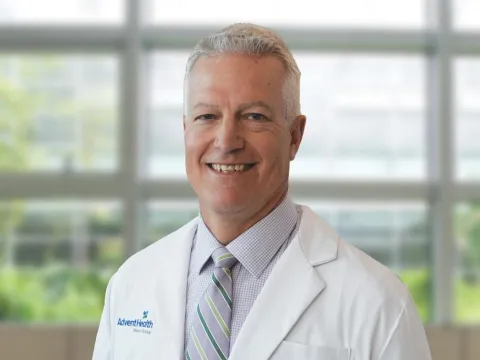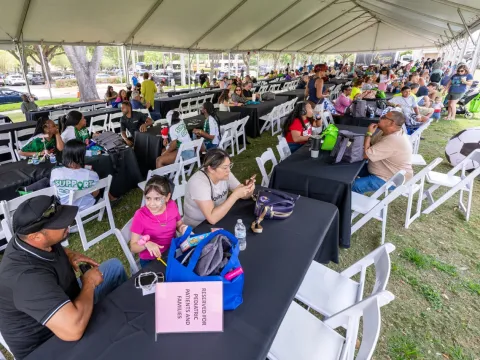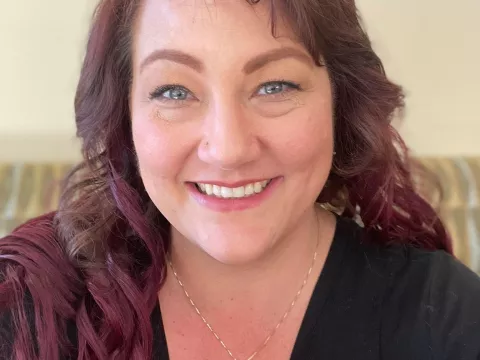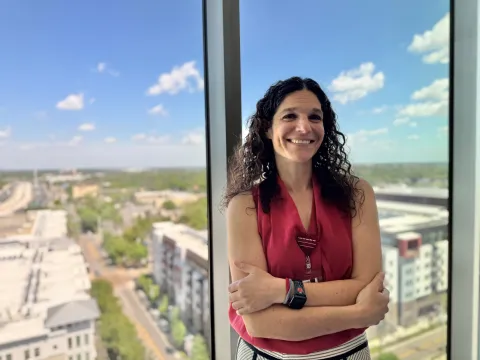- AdventHealth
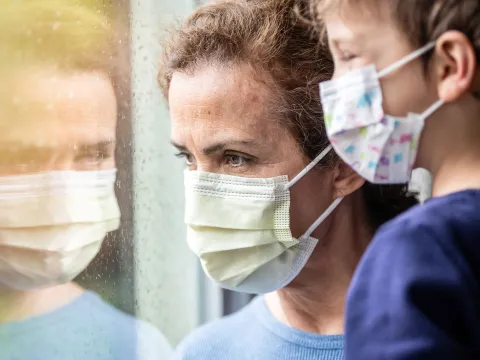
COVID-19 has ushered in a series of unprecedented actions and behaviors to mitigate the spread of the disease. The pandemic’s shutdowns, stay-at-home orders and resulting economic downturn have had noticeable impact, negatively affecting people’s emotional well-being.
As a licensed professional counselor (LPC), Kansas-based mom Kellie Strube has realized even she is not immune to the emotional impacts of the COVID-19 pandemic. With a son gearing up to begin school in the fall, Strube said she’s had anxiety navigating life’s new normal amid the global pandemic. Serving as the clinical coordinator for the behavioral health intensive outpatient program at AdventHealth Shawnee Mission, Strube regularly leads out in group therapy and teaches clients healthy processing skills. “I feel lucky that I’m a therapist because I have a lot of skills, but even I can see myself spiraling sometimes,” she said.
Strube is not alone. A nationwide survey assessing the effects of the COVID-19 pandemic on the emotional well-being of U.S. adults reported 90 percent of its participants experienced emotional distress.
In Florida, a state especially hard-hit by a resurgence of COVID-19 cases, Luis Allen, MD, psychiatrist and medical director of AdventHealth’s Center for Behavioral Health, is seeing an increase in anxiety disorders and substance abuse, particularly alcohol, in his work with the emergency departments. The trends are alarming, but he’s not surprised.
“Everybody is looking intently at the graph of COVID cases trying to see if the curve is going down, but even if there is a downturn of infections, mental health issues may still be growing in exponential ways for a significant portion of the population,” Dr Allen said.
With study after study pointing toward a growing behavioral health crisis, health professionals are finding ways to help people cope and seek help when they need it.
Accepting What You Can’t Control
“Human beings like structure and predictability and if those are removed, we become overwhelmed,” said Rennie Shuler-McKinney, LPC, clinical director of behavioral health for AdventHealth Shawnee Mission.
One of the most challenging aspects of the COVID-19 pandemic has been the myriad of changes to everyday life. Trying to maintain some sense of normalcy has become difficult for most.
Shuler-McKinney has adopted and taught her clients the power of gratitude, highlighting the role it plays in helping build coping capacity and strengthening overall well-being.
Strube engages her clients with the concept of radical acceptance – the idea that if nothing can be done about something, there’s no sense in fighting it – to help them overcome the many changes outside their control. She also has them practice an exercise called thought replacement where they reframe their belief or interpretation of an event.
“Thought replacement is about changing the way we look at a situation,” said Strube. “If I keep telling myself, ‘it’s not going to get better’ it will only get worse. So how can I think about it differently?”
Staying Connected While Physically Distanced
Most everyone has experienced severed connections with family and close friends because of quarantine and physical distancing mandates brought on by the pandemic. Maintaining social connections is vital, said Shuler-McKinney, as the isolation has led to an uptick in suicides in her community. “We certainly don’t want to lose life from COVID, but we don’t want to see so much loneliness that we see deaths from suicide, too,” she added.
Finding different ways to reach out and connect with loved ones, whether it’s picking up the phone, video calling or even driving over and standing at the end of the driveway, is vital to maintaining that emotional connection amidst physical distance.
Taking Care of Your Body and Spirit
AdventHealth’s whole-person care delivery model addresses health in three facets: the physical, mental and spiritual. Research has shown the three are interconnected and behavioral health experts advise taking care of the body to boost mental and emotional well-being.
Eating a healthy diet, exercising and maintaining a strong spiritual life are a few suggestions to help maintain positivity. Paying close attention to any physical warning signs that you may be emotionally struggling (such as sleeping patterns and eating habits) is also key to emotional well-being.
Dr. Allen said these warning signs are particularly important for health care workers who are on the front lines of the COVID-19 pandemic caring for others, oftentimes at their own health’s expense. “The challenging part is taking care of ourselves,” he said. “We have to recognize that no one is immune. We are just as vulnerable and so we can’t let symptoms linger. We have to seek early intervention.”
Recognizing the importance of caring for the caregiver in the COVID-19 fight, the behavioral health team at AdventHealth Shawnee Mission fast-tracked some of the support resources they were developing for employees prior to the pandemic. Now, team members facing any issue, whether personal or professional, have access to immediate support, free-of-charge, right on campus.
Additionally, the AdventHealth Shawnee Mission team set up a serenity room complete with gratitude, prayer, drawing and hydration stations, and a monthly call with an open line for any team member who wishes to dial in and learn about coping. These are in addition to the various support resources that were made available to team members across AdventHealth’s system through their employee benefits and other programs.
Seeking Help When You Need It
“The needs are great, but the lack of awareness is greater,” Dr. Allen said. “We need to improve awareness in order to be able to address the need.”
While the pandemic’s impact on mental and emotional health is starting to come to light, many may ignore the warning signs or avoid seeking help because of a lack of awareness and education.
In an immediate crisis, Shuler-McKinney advises going to the emergency department or calling 911 and getting to a physically safe environment. Speaking to a therapist, a more long-term approach, can enhance coping skills and life skills. “It teaches you techniques that can help improve your relationships and communication,” she shared.
Dr. Allen added that online resources, such as those on the Mental Health Association of Central Florida website, may be a good place to start. “Not everyone is going to be willing to talk to someone [off the bat] but going to a website where you can take a self-assessment might be the spark you need.”
The important thing is to start.
Recent News
Final steel beam marks key step in AdventHealth Daytona Beach expansion
Local leaders, officials, and construction workers gathered today to commemorate a major milestone in the expansion underway at AdventHealth Daytona Beach: placing the final steel beam.
Dr. Jeffrey Keen, a board-certified orthopedic surgeon specializing in adult reconstruction, orthopedic surgery, robotic-assisted surgery, and sports medicine, has returned to AdventHealth Medical...
In recognition of National Donate Life Month, nearly 300 transplant patients and their families enjoyed AdventHealth’s 2025 transplant reunion.
According to the National Kidney Foundation, more than 101,000 people are currently on the organ transplant list in need of a new kidney. However, only about 17,000 transplants happen each year —...
The AdventHealth Board of Directors has appointed David Banks as the organization’s new president/CEO, effective immediately.
In life, Sophie Davis touched dozens of hearts. In passing, one of her organs could possibly save thousands of lives.
As the days get longer and the weather warms up, people are eager to get back to their favorite outdoor spring activities and sports. This transition from winter to spring often leads to an increased...
Marie Williams remembers being admitted to AdventHealth Parker on September 1, 2023, for colon resection surgery, but after that, things get hazy.
AdventHealth for Children is a nationally recognized children’s hospital and comprehensive care network caring for nearly 200,000 children annually.
Care Management Assistant, Meghan Bussard, was the recipient of the 2024 Outstanding Team Member Award for AdventHealth Shawnee Mission. Bussard is known across AdventHealth Shawnee Mission as a...
As the only physician in Central Florida certified to use the intestinal ultrasound, a cutting-edge diagnostic tool still new to the U.S., Dr. Jennifer Seminerio-Diehl is transforming the way IBD is...
Every March, we celebrate Women’s History Month and the countless contributions women have made across all parts of society, including health care. One such area where women have made remarkable...


